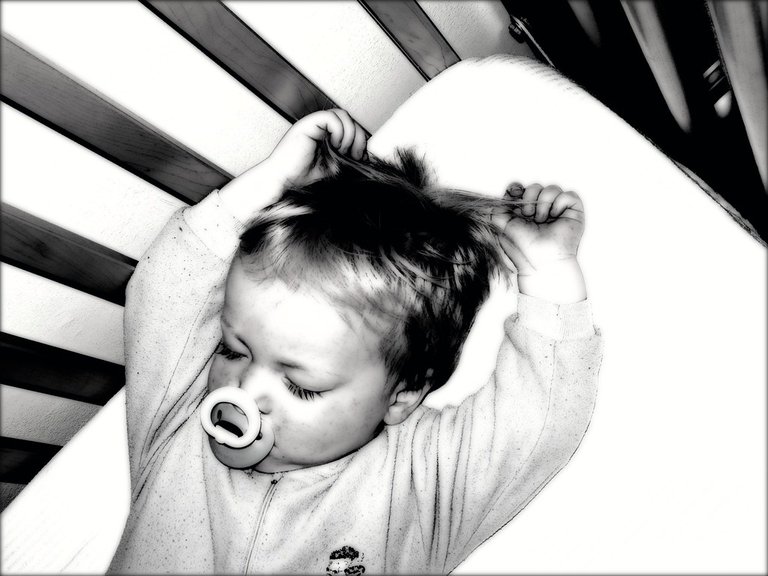You know this thing about everyone wanting to post all about their lives on social media these days, it is very common to have that now, so a woman posted her child aggressively pulling off her hair, it didn't seem normal to me, I mean it was so scary, so I decided to make my research and I found out that, infants could pull off their hair for different reasons.
Some children pull out their hair due to stress and they find this act as a coping mechanism, it may be nothing to worry about, but there are times when it gets serious and compulsive, then we may be looking at a situation of trichotillomania.

Source
When talking about trichotillomania, we are looking at a case of consistent and obsessive hair-pulling acts, the child would have this irresistible urge to pull out hair from every area he finds it, the head, eyebrows, and lashes, and at this point, it could be a mental health condition. The good thing however is, that with patience and simple supportive strategies, the child can overcome
The existence of trichotillomania often comes with other mental health conditions, and in some other cases, it may not. This act may be considered an OCD case as it involves repetitive behavior. It may also be associated with a case of tic disorder like Tourette syndrome.
Trichotillomania has a similar link with anxiety disorders like; social anxiety disorder and panic disorder. These feelings of distress are what often proceed to the act of intense hair-pulling.
It is usually more severe when an adult has a combination of depression and anxiety, it is most likely that it holds for children as well, but more research needs to be done in this case. Grooming disorders are also common in children, they involve the act of nail chewing, and hair pulling with skin picking. These are repetitive acts that could cause harm to the body.
We need to understand that, not every act of hair-pulling can be considered a case of trichotillomania, it has to be consistent and cause impairment in daily living before it is classified as such. As this child grows up and understands what he is doing, he may begin to feel ashamed of his actions and outlook, since they could easily feel triggered to remove any hair they notice on any part of the body. But after the hair is pulled out, there is usually a feeling of relief that follows afterward.

Source
Apart from boredom as mentioned earlier, experts believe that other causes of trichotillomania are possible as well.
Genes contribute significantly to the development of
trichotillomania, a family history of its occurrence would most likely cause its repeat in another family member.
Reward hormone "dopamine" is usually released once the satisfaction attached to hair removal is attained, this would result in consistent removal to get this satisfaction all the time. If this habit is not curtailed until teenage age or adulthood, it may make the affected person frustrated that they cannot control their actions and their physical attributes are affected.
Since this feeling is so bad that it could result in physical embarrassment and a terrible habit for our kids, then it is something that needs to be controlled as soon as we realize it is becoming a habit.
Habit reversal training is a treatment option, and it is a form of CBT made up of three main types;
The first thing is for parents/caregivers to become aware of the act, and then create an alternative for the act, when the kids use this alternative, they should be applauded and cheered on for consistency.
The most important thing however is to seek the help of a medical practitioner who will carry out therapy to help with the condition. Medications may be provided to the child but it is usually not enough, there is a need to support the intake of the medication with good therapy.
It is also necessary that parents learn not to victimize their child/children when they engage in this act, the best thing is to get help them. Provide your children with a listening ear and let them be able to relate with you freely, narrating their fears so you can understand where exactly to begin providing solutions.
The act of hair pulling may be a phase that would pass or a permanent one, but how can one know if proper attention is not paid to the habit of the child? What started as a short-term disorder could then turn into an uncontrollable condition with symptoms coming in within weeks, turning into months, and even into years if not treated.
Conclusion
While I consider the act of this woman positing her child on the internet as being unnecessary, I am still happy I was able to learn a thing or two through her actions. Parenting is indeed a long-term task, as we are responsible for our children all the time, so rapt attention needs to be paid to them in order not to miss out on any detail.
References
https://psychcentral.com/stress/child-pulling-hair-out-when-stressed#treatment-options
https://kidshealth.org/en/teens/trichotillomania.html
https://www.healthline.com/health/childrens-health/child-pulling-hair-out-when-stressed#treatment
https://www.mayoclinic.org/diseases-conditions/trichotillomania/symptoms-causes/syc-20355188

Hi, I am Tobi, a writer, speaker, relationship blogger, and lover of good music. I love making friends and learning from people. If you want to hear me speak on relationships and general life issues, you can find my YouTube channel where you can watch any episode for free, please do not forget to subscribe, friends. I sincerely appreciate every love I get from here, Kindly do well to keep them coming.
Thanks for your contribution to the STEMsocial community. Feel free to join us on discord to get to know the rest of us!
Please consider delegating to the @stemsocial account (85% of the curation rewards are returned).
Thanks for including @stemsocial as a beneficiary, which gives you stronger support.